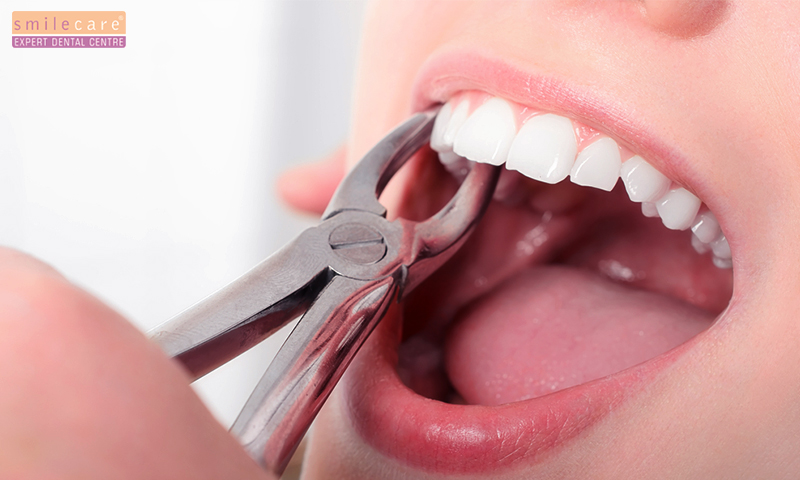Many of us experience toothaches nowadays, which can be due to excess sweets or even improper hygiene routines. Different approaches to curing this type of pain include cavity fillings, root canals, and crown. At times, the tooth cannot be treated and requires a tooth extraction.
Here are some of the tooth issues that should be taken seriously & may need instant attention from an experienced dentist.
- Decay or infection: If a tooth has been damaged or decayed beyond repair, an extraction may be necessary to prevent the spread of infection. This condition can happen when you maintain poor hygiene. There are times when you opt for a tooth filling procedure, yet it may decay after filling; during this stage, the dentist will recommend tooth removal .
- Crowding: In some instances, the jaw doesn’t support the permanent teeth size. One of the major causes of teeth shifting or emerging into unexpected places is tooth crowding. One or two teeth can be extracted to create space and allow braces to realign the remaining teeth.
- Impacted teeth: Wisdom teeth that do not have space for emerging can cause pain, swelling, and infection. Such teeth need to be extracted to eliminate the risk of infections, overcrowding or toothaches.
- Periodontal disease: Severe gum disease can cause the loss of bone and tissue that supports the teeth, leading to tooth loss. If proper care is not taken then it could lead to major issues. The last option will be opting for a tooth extraction.
- Baby teeth that don’t fall out: Sometimes, milk teeth don’t fall out on time to make room for adult teeth, and an extraction may be necessary to ensure proper alignment. The dentist examines to understand why the baby’s tooth is not falling out. Once the extraction is done, the permanent teeth can be expected to arrive as there will be space for their eruption.
- Risk of infection: If a tooth is broken or has advanced decay, it may need to be extracted to prevent the spread of infection. Even if you had an accident or shattered the tooth into multiple pieces, this could cause a tooth extraction. Extraction of the teeth will give you relief from the pain and limit the chances of spreading infection into the jawbone.
Smile Care India dental clinic has an experienced team providing comprehensive, world-class treatments under one roof. Now you don’t have to be worried about adequate therapy without the fear of extreme pain. We follow strict sterilization protocols with high standards of hygiene. We have an experienced, in-house, acknowledged team with a quality approach and commitment towards excellence. We provide multiple solutions here related to dental issues. Now cross bit, crowded teeth, teeth gaps, etc., can be cured here with guidance, support & treatment. A wise man once said,” Smile; it lets your teeth breathe”.
FREQUENTLY ASKED QUESTIONS
1. What are the reasons you might need a tooth extraction?
- Impaction, tooth decay, periodontal and gum disease, trauma, or tooth overcrowding are all reasons a dentist may recommend a tooth extraction.
2. Can I brush after tooth extraction?
- To be on the safe side, don’t brush or rinse the mouth in the first 24 hours after the tooth extraction procedure. Thereafter, brush with care and don’t allow the toothbrush to get close to the extraction site. Also, don’t swish water, mouthwash or any oral care fluid in your mouth.
3. What should I avoid after tooth extraction?
- Don’t drink with a straw. Sucking on a straw may dislodge the blood clot.
- Don’t drink hot liquids. Hot liquids may increase swelling. Limit your alcohol use. Excessive use of alcohol may slow healing.
- Don’t smoke. Smoking may break down the blood clot. This can cause a painful tooth socket.
4. How long does it take to recover from a tooth extraction?
- It depends on the complexity of your case. However, most people feel back to normal in just a few days. While you’ll be able to return to routine activities within 48 to 72 hours, it usually takes the jawbone several weeks to heal completely.
5. What are the most serious dental problems?
- Tooth Decay. Tooth decay is also known as dental caries or dental cavities.
- Gum Disease. Gingivitis is the early stage and mild form of gum or periodontal disease.
- Bad Breath.
- Sensitive Teeth.
- Cracked or Broken Teeth.
- Receding Gums.
- Root Infection.
- Enamel Erosion.

